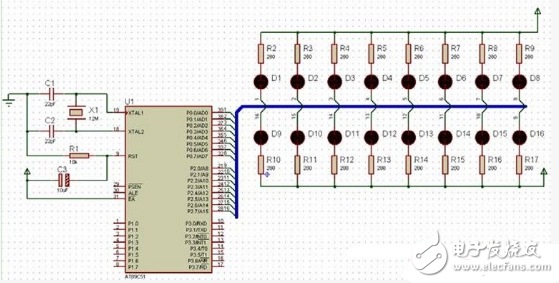The application of LED water-flow lamps based on single-chip microcontrollers is very widespread. It's common for the core controller to manage control functions and data input through buttons. When the number of required buttons is small, the system often uses separate buttons. This configuration offers flexible circuit design and a simple software structure.
In this article, we will discuss the implementation of a flow light using TIMER0 in C programming for a single-chip microcontroller. Below is the schematic diagram illustrating how TIMER0 controls the flow light:
#define uchar unsigned char
#define uint unsigned int
void main()
{
uchar T_Count = 0;
P0 = 0xfe;
P2 = 0xfe;
TMOD = 0x01; // Timer 0 in mode 1
TH0 = (65536 - 40000) / 256; // 40ms timing
TL0 = (65536 - 40000) % 256;
TR0 = 1; // Start timer
while(1)
{
if(TF0 == 1)
{
TF0 = 0;
TH0 = (65536 - 40000) / 256; // Reload initial value
TL0 = (65536 - 40000) % 256;
if(++T_Count == 5)
{
P0 = _crol_(P0, 1);
P2 = _crol_(P2, 1);
T_Count = 0;
}
}
}
}
```
This program uses Timer 0 to create a flowing LED effect on ports P0 and P2. The timer is set to generate an interrupt every 40 milliseconds, and after five such intervals, the LED pattern shifts to the left. This approach allows for smooth and continuous movement of the light effect without using interrupts, making it suitable for simple applications.
If you're interested in similar projects, you might also enjoy reading about "T0 control LED design of single-chip C language programming to achieve binary counting."

Concentric Cable-SNE CABLE SANS 1507-6
Concentric Cable-Sne Cable Sans 1507-6,Sne Cable,Airdac Cable,Airdac Sne Cable
HENAN QIFAN ELECTRIC CO., LTD. , https://www.hnqifancable.com
